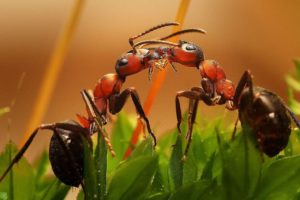Ants are among the most socially complex and ecologically significant organisms on the planet. Their behavior, communication, and farming practices often draw comparisons to humans, especially in the realm of food production and agriculture. One of the most remarkable yet lesser-known aspects of ant behavior is their ability to engage in a form of fermentation that produces antibiotics. This unique biological process not only highlights the advanced capabilities of ants but also offers insights into potential applications for human medicine.
Ant Societies and Their Needs
Ants live in highly structured societies, often referred to as colonies, which can range from a few dozen to millions of individuals. These colonies thrive through cooperation, with various castes performing specialized roles such as foraging for food, defending the nest, and tending to the queen. Given their dense populations, ants are particularly susceptible to diseases and infections, making it essential for their survival to develop means of controlling microbial threats.
The Role of Microbes in Ant Colonies
Ants maintain a symbiotic relationship with various microorganisms, including bacteria and fungi, which play crucial roles in their survival and health. Among these is their remarkable ability to cultivate specific microbes that produce antibiotics through fermentation. This fascinating microbial farming is part of a broader evolutionary strategy that not only controls pathogens within the nest but also regulates the overall health of the colony.
The Fermentation Process in Ants
1. Microbial Cultivation:
– Ants often engage in what is known as “microbial gardening.” Some species, such as leafcutter ants, collect leaves not for direct consumption but to cultivate fungi. The fungi break down the plant material, fermented by the natural enzymes produced by the ants.
– In addition to fungi, certain bacteria are also cultivated in the nest, forming a part of the ants’ microbiome.
2. Fermentation Mechanism:
– The fermentation process occurs when the collected plant material or organic matter decomposes under controlled conditions within the ant nest.
– The fermentation produces organic acids, alcohols, and other metabolites, which can have strong antimicrobial properties.
3. Antibiotic Production:
– Some of the bacteria cultivated by ants produce antibiotics as secondary metabolites. The most notable are species from the genera Streptomyces and Bacillus, which are known for their ability to produce various antibacterial compounds.
– These antibiotics help control harmful microorganisms, ensuring the cleanliness of the nest and the health of its members.
Examples of Ants That Utilize Fermentation
1. Leafcutter Ants (Atta and Acromyrmex):
– These ants are perhaps the most famous for their agricultural practices. They cut leaves and transport them to their underground nests, where they ferment the material to cultivate a specific fungus, which serves as their primary food source.
– The bacteria associated with these fungi also produce antibiotics that protect against pathogens, including those harmful to the fungus.
2. Carpenter Ants (Camponotus):
– Carpenter ants can produce substances that act as antibiotics to inhibit the growth of bacteria within their nests. They cultivate certain bacteria on their bodies that can naturally produce antibiotic compounds.
3. Fire Ants (Solenopsis):
– Fire ants also exhibit fermentation behaviors. They produce antimicrobial substances in their venom and can use specific microbial communities to combat pathogens within their nests.
Implications for Human Medicine
The study of how ants produce antibiotics through fermentation has significant implications for human medicine. Given the rising threat of antibiotic-resistant bacteria, researchers are increasingly interested in the unique microbial ecosystems found in ant colonies.
– Natural Antibiotics: The compounds produced by ant-associated bacteria could be valuable in developing new antibiotics.
– Biotechnology Advances: Understanding the interaction between ants and their microbial partners may lead to biotechnological innovations, allowing the harnessing of fermentation processes in a laboratory setting to produce novel antimicrobial agents.
Ants, with their sophisticated social structures and behaviors, demonstrate remarkable adaptations to environmental challenges. Their ability to engage in fermentation that produces antibiotics showcases an incredible example of natural selection and microbial symbiosis in action. As researchers continue to study these processes, the potential applications for agriculture and medicine could prove invaluable, highlighting the significant contributions that understanding nature can make to human health and sustainability. This fascinating interplay between ants and their microbial allies is not just a testament to the adaptability and resilience of these tiny creatures, but also a source of inspiration for the challenges faced in human medicine today.

 Pazionmedia.com Pazion Media l Latest News l Politics l Sports l Entertainment
Pazionmedia.com Pazion Media l Latest News l Politics l Sports l Entertainment



